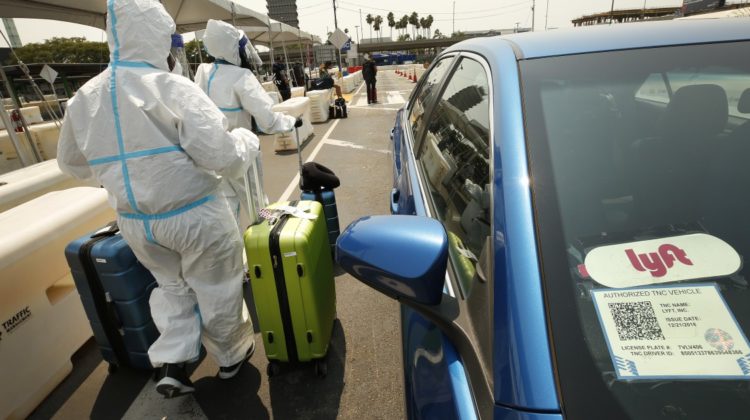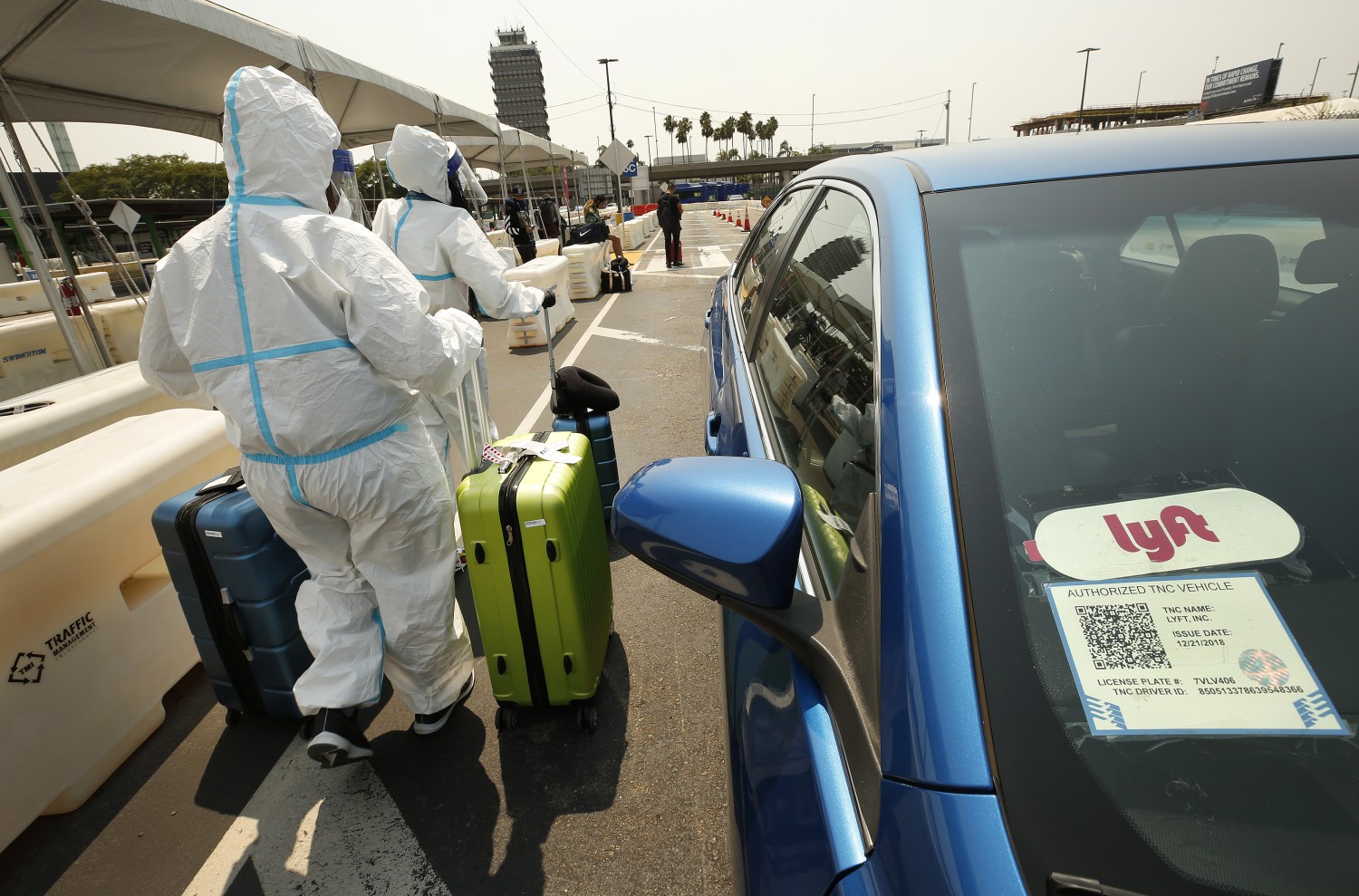

A flurry of notifications lighted up the phones of Lyft and Uber users in California early this week.
“Save rideshare in California!” one from Lyft read.
For the record:
5:37 PM, Aug. 20, 2020An earlier version of this story misspelled the last name of Lyft spokeswoman Julie Wood.
“Service update: Ridesharing in CA may be suspended,” Uber wrote.
The warnings are the result of California’s efforts to bring gig economy companies in compliance with state labor law — a clash that threatened to come to a head this week.
An emergency stay granted Thursday by a California appeals court temporarily defused the situation, allowing Uber and Lyft to continue operating under their current model for the time being. But unless a resolution is reached, millions of Californians who use Uber and Lyft to hail rides may yet find themselves forced to resort to other modes of transportation.
In early August, a San Francisco Superior Court judge ordered the companies to classify their drivers as employees rather than independent contractors, building in a 10-day window for the companies to appeal the move. With that window closing Thursday night, Uber and Lyft had threatened to shut down services at midnight Thursday, saying they cannot transition their business models quickly enough. Lyft reiterated that threat in a blog post Thursday morning, saying: “This is not something we wanted to do.”
The judge, Ethan P. Schulman, dismissed both companies’ initial appeals last week. Uber and Lyft filed pleas for immediate stays to a California court of appeal, which granted them Thursday. Both companies now have five days to agree to the process laid out by the court and two weeks to produce a sworn statement saying they have plans in place to come into compliance with the law should a ballot measure they are backing, Proposition 22, fail in November. The measure would redefine ride-hailing and delivery drivers as independent contractors with specific labor and wage protections. The companies have spent millions on the initiative and an advertising campaign to support it.
The court battle began with a lawsuit brought by state Atty. Gen. Xavier Becerra in May alleging that by misclassifying drivers as independent contractors, the companies deprived them of worker protections and benefits such as a minimum wage and unemployment insurance.
The move was part of the state’s efforts to force the companies to comply with landmark employment law Assembly Bill 5, which established stricter standards for companies to treat workers as independent contractors rather than employees. Essentially designed to grant employment benefits to gig workers, the law went into effect Jan. 1, but companies such as Uber, Lyft, DoorDash and Postmates have vehemently resisted compliance.
Critics have said the companies have had substantial time to figure out how to transition their operations, given AB 5 was approved about a year ago, and are using the threat of shutting down their services in California to leverage a favorable outcome for Proposition 22, banking on scare tactics to persuade voters to support the initiative.
“Uber and Lyft are threatening to kill jobs in California. I believe the companies are trying to force us into a decision around giving them what they want, and that’s Prop. 22, which is to keep denying us basic labor protections and benefits we have earned,” said Cherri Murphy, a ride-hailing company driver for about three years. An Oakland resident, Murphy is also an organizer with labor groups Gig Workers Rising and Rideshare Drivers United, which have fought to win protections for drivers.
Uber pushed back on this assessment, saying many drivers prefer to remain independent contractors. “The vast majority of drivers want to work independently, and we’ve already made significant changes to our app to ensure that remains the case under California law. When over 3 million Californians are without a job, our elected leaders should be focused on creating work, not trying to shut down an entire industry during an economic depression,” Uber spokesman Davis White said in a statement.
Lyft spokesman CJ Macklin declined to comment on the record but pointed to an excerpt of Lyft’s earnings call last week. Co-founder John Zimmer said on the call that if efforts to appeal the injunction were not successful, it would force the company to suspend operations in California.
“Fortunately, California voters can make their voices heard by voting yes on Prop. 22 in November,” Zimmer said, and if passed, the measure “would protect driver independence and flexibility, while providing historic new benefits and protections.”
Uber and Lyft have been tight-lipped about what the future will look like if or when they are forced to comply with AB 5.
The companies are quietly exploring licensing their brands to independently operated franchises commanding vehicle fleets in the state. Such a model would place more layers between the companies and the drivers, giving them more latitude to avoid claiming the drivers as employees. Uber already operates on this model in Germany and Spain.
Asked about these discussions, which were first reported by the New York Times, Lyft deflected. “We’ve looked at alternative models, and the one that would work best for drivers is what we’re supporting in the ballot measure — they remain independent and can work whenever they want while also receiving additional healthcare benefits and an earnings guarantee,” spokeswoman Julie Wood said in a statement.
Labor lawyer Shannon Liss-Riordan, who has litigated against Uber on behalf of drivers over the years, said there is nothing about employee status that would prevent the companies from affording their employees flexibility in work.
“Uber’s strategy all along has been to void legal obligations,” Liss-Riordan said. “Hard for me to understand why a company has to shut down in order to comply with the law.”
Uber is not planning to halt operations for its delivery service, Uber Eats, because Becerra’s lawsuit did not specify drivers for that platform, the company said. Uber’s delivery orders have more than doubled in the second quarter, with Americans relying on deliveries to avoid exposure to the coronavirus during the pandemic. At the same time, ride-hailing trips have taken a significant hit, down 75% from last year.
San Francisco’s district attorney sued food delivery app DoorDash in June, alleging worker misclassification. Uber said it anticipates a similar fight on this front.
